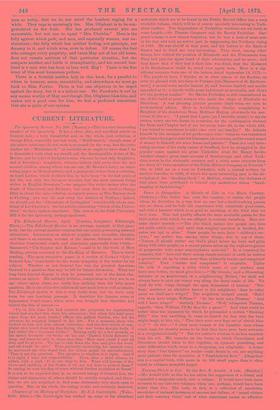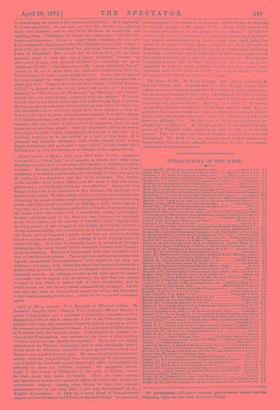Turning-Points in Lift. By the Rev. F. Arnold. 2 vols.
(Bentley.) —Mr. Arnold tells us that he has taken the suggestion of a friend, and expanded a magazine article into a volume. It would have been more accurate to say into two volumes, when one, perhaps, would have been better than two. The book, in fact, is a collection of anecdotes, anecdotes of eminent instances of success and failure, of "moral virtues and their contrary vices," and of what sometimes seems as effective
in distributing the prizes of life, of good and bad luck. It is impossible to review anecdotes ; we can only say that Mr. Arnold has collected them with industry, and is very fairly felicitous in connecting and applying them. Sometimes, of course, one cannot agree with his com- ments and inferences. It was a happy thing, doubtless, for the late Lord Ashburton, that by marrying Miss Bingham he not only secured a good wife, but also "consolidated the American business of the great house of Bingham." But we are not so certain that "in an inter- national point of view this was a happy marriage," because "in after-years it gave him peculiar facilities for concluding the groat Ashburton Treaty." Our impression of the "great Ashburton Treaty" is that in it, as in more than one diplomatic transaction with the United States, we were conspicuously worsted. To the general plan of the book it might ho objected that its special subject occupies but a small part of it. Chapter three of the first volume, "Critical Moments in Life," is indeed strictly to the point; but essays on University Careers," on " The Choice of a Profession," on "Marriage," on "Travel," and the like, are but remotely connected with the subject. It is true, indeed, that in the life of every man who achieves any kind of renown, there is commonly sometime when, had things gone otherwise than they did, the whole course of events might have been changed, so that Mr. Arnold's plan may be made comprehensive enough. It would be strange if in running through any life the biographer could not pause at some moment, and say, "Now, if this had not so happened, then the man would never have been great." Only the argument proves too much. One might include a whole biographical dictionary, at this rate. It is needless, however, to ho too critical on a book of this kind. It is pleasant and readable, wholesome stuff which should make young people industrious and good, and " sugar-coated " to suit tastes which will not put up with the bitterness or strength of the regular sermon.



































 Previous page
Previous page